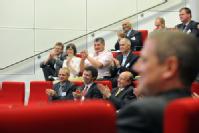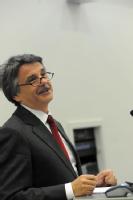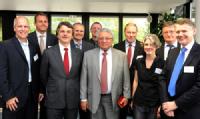WMG News
WMG Officially Launches International Doctorate Centre
 WMG has officially launched its new International Doctorate Centre in High Value, Low Environmental Impact Manufacturing.
WMG has officially launched its new International Doctorate Centre in High Value, Low Environmental Impact Manufacturing.
Guests from both industry and the education sector heard how WMG will train the manufacturing leaders of tomorrow through a 4 year programme which will see them achieve both an Engineering Doctorate (EngD) and an MSc in Innovation and Entrepreneurship.
WMG was awarded one of five new Industrial Doctorate Centres by the Engineering and Physical Sciences Research Council (EPSRC) earlier this year. The new centres were designed by EPSRC to address fundamental engineering challenges in advanced manufacturing engineering. The WMG centre will focus on High Value, Low Environmental Impact Manufacturing. The companies supporting the centre are Jaguar Land Rover, Arup, BAE Systems, Johnson Matthey, PTC and TTI.
Chairman of WMG, Professor Lord Bhattacharyya, said “this is an exciting day for WMG and the next step on a very long journey which we would not have been able to take without the support of our partners. Just as companies always have to adapt to the changing global landscape, we must constantly listen to them, and innovate with them. At WMG we have a rich heritage to draw on. We know that the economy needs new SMEs to prosper, and for that they need leaders with research expertise and practical business experience that matches that of the global giants they work with. Our new Centre builds on the pedigree of our long-running EngD programme which has developed a generation of research entrepreneurs who are making a difference in companies around the world.”
Dr Ralf Speth, CEO of Jaguar Land Rover and Chair of the Centre’s Steering Group, believes that the Centre has an important role to play in both industry and society. “WMG can become the incubator for tomorrow's industrial leaders; highly skilled, business trained, internationally minded, innovative and committed to securing a low carbon future. That includes bridging across silos and functions and creating new expertise patterns and new job disciplines. The International Doctorate Centre can make the difference and we at JLR are proud to be one small part of it, together with other industries like BAE Systems, Johnson Matthey and ARUP to name some of the members of the centre's steering group. WMG is bridging the gap between research excellence and industrial success. It will be the hub for a growing number of corporate partnerships and new forms of collaboration.”
With the support of a sponsoring company, students or ’ Research Entrepreneurs’ will gain an understanding of academic, business, cultural, and environmental issues in global manufacturing nations. The Centre offers the opportunity for overseas study in China, the USA, India and Singapore. WMG will provide unrivalled access to industrial, international, academic, policy maker and political networks.
Mark Claydon-Smith, Lead in Manufacturing the Future for EPSRC, spoke about the expected impact on not just the collaborating companies and their industries but on the wider community and the host University. The EngD qualification has existed since 1992 and remains the cornerstone of EPSRC’s engineering research portfolio. “Companies commit to sponsoring the programme because they can see the value and benefit to their organisation in providing high calibre technical people who can stimulate and manage change”.
the expected impact on not just the collaborating companies and their industries but on the wider community and the host University. The EngD qualification has existed since 1992 and remains the cornerstone of EPSRC’s engineering research portfolio. “Companies commit to sponsoring the programme because they can see the value and benefit to their organisation in providing high calibre technical people who can stimulate and manage change”.
Dr Kerry Kirwan, Strategic Director of the new Centre told the audience that while he himself had done the original Engineering Doctorate, he believed that this new qualification was even better. “The new International Doctorate is about globalisation and understanding different working practices and cultures with an emphasis on external activity within companies and an outward focus”.
The two key elements – international and real world business exposure – will help make the High Value, Low Environmental Impact Manufacturing research that students will undertake both relevant and fulfilling; not only to themselves but to their future employers in the manufacturing industry.
For further information please contact:
Peter Dunn, Head of Communications
University of Warwick 024 765 23708
or mobile 07767 655 860
Notes for Editors
The Centre: The new EPSRC sponsored Centres will train Engineering Doctorate (EngD) students. These four-year postgraduate awards are intended for the UK’s leading researchers pursuing a career in industry. It provides postgraduate engineers with an intensive, broad-based research programme incorporating a taught component relevant to the needs of, and undertaken in partnership with, industry. It is a radical alternative to the traditional PhD, being better suited to the needs of industry and providing a more vocationally orientated doctorate degree, with the student spending a significant proportion of their time working in a company.
Each centre will support a cohort of at least 6 to 10 doctorate students per year for 4 years. The centres will provide an experience that will ensure these students are very well placed to become the industrial research leaders of tomorrow. In the case of WMG, its core support from the Engineering and Physical Sciences Research Council combined with industry, totals £10m, enabling initial cohorts of 10 participants an annum that will rapidly expand to a level of 30 new participants an annum.
The Engineering Doctorate (EngD) is a well established four-year postgraduate award intended for the UK’s leading researchers aiming for a career in industry. It provides postgraduate engineers with an intensive, broad-based research programme incorporating a taught component relevant to the needs of, and undertaken in partnership with, industry. It is a radical alternative to the traditional PhD, being better suited to the needs of industry and providing a more vocationally orientated doctorate degree, with the student spending a significant proportion of their time working in industry.
The Engineering and Physical Sciences research Council (EPSRC) is the UK’s main agency for funding research in engineering and physical sciences. The areas covered range from information technology to structural engineering, and mathematics to materials science. This research forms the basis for future economic development in the UK and improvements for everyone’s health, lifestyle and culture. EPSRC also actively promotes public awareness of science and engineering. EPSRC works alongside other Research Councils with responsibility for other areas of research. The Research Councils work collectively on issues of common concern via research Councils UK.


